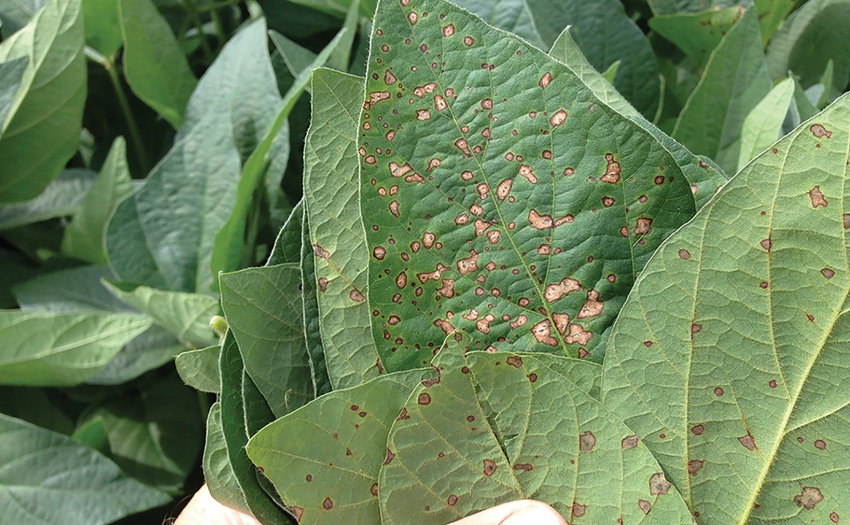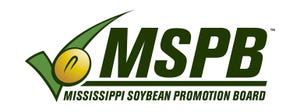December 9, 2020

Selecting a disease-resistant soybean variety to plant in the right field is a critical first step to maximizing yield potential.
There are many good-performing soybean varieties available for mid-south farmers to plant and no single variety is superior. Some varieties are more adapted to specific, local growing conditions than others and selecting a variety for planting requires knowledge of the reaction to important diseases, nematodes and herbicide-trait tolerances, as well as the yield performance on a particular soil class.
A great place to start is the 2020 Soybean Variety Trial available on the Mississippi Agricultural and Forestry Experiment Station (MAFES) Official Variety Trial website. In addition, disease ratings can be obtained from the current year’s trials as well as previous years on the Mississippi Crop Situation Blog: www.mississippi-crops.com.
With funding help from the Mississippi Soybean Checkoff program, the MAFES Official Variety Trials examine yield and other important data to provide unbiased, comprehensive information that assists farmers in making pivotal decisions on variety selection. Trials are evaluated at each location for the diseases that occur throughout the season (e.g., Cercospora blight, frogeye leaf spot when present, Septoria brown spot, southern blight, target spot).
Understand Disease Ratings
Understanding disease ratings is important since some plant diseases can result in significant economic losses if not properly managed. One important disease management alternative would be to choose a disease-resistant soybean variety. Soybean farmers should make every effort to select soybean varieties that are resistant to diseases such as frogeye leaf spot and stem canker. Both diseases are more common in situations where soybean is grown continuously but can be managed by choosing varieties with documented resistance. Farmers should consult information provided by seed companies as well as consider unbiased information based on varietal performance in local and regional variety trials conducted by university variety trial programs.
Relying on disease ratings from the region where the soybean variety is to be planted is important. Considering the response of a given variety in the specific planting region is important since pathogen populations differ. One important example, the fungus that causes stem canker differs in the southern versus the northern U.S. Diaporthe aspalathi causes stem canker in Mississippi, while a different fungal species can be responsible for stem canker in parts of the northern U.S. A variety adapted for planting in other parts of the U.S. may not be resistant to the causal organism that occurs in Mississippi. When considering the response of a variety to stem canker in particular be mindful to verify that the information provided on a variety is based on testing from the mid-south.
The Mississippi Soybean Promotion Board (MSPB) sponsors research to consider the response of soybean varieties to the diseases that occur in the state on an annual basis. The official variety trials (OVTs), generally planted at 11 locations throughout Mississippi each year, are observed for the presence of naturally occurring diseases. Those data are then provided on the Mississippi Crop Situation (www.mississippi-crops.com) to guide farmers in choosing varieties. In addition, stem canker susceptibility trials are conducted in Stoneville, Miss., on an annual basis.
Promotion Board (MSPB) sponsors research to consider the response of soybean varieties to the diseases that occur in the state on an annual basis. The official variety trials (OVTs), generally planted at 11 locations throughout Mississippi each year, are observed for the presence of naturally occurring diseases. Those data are then provided on the Mississippi Crop Situation (www.mississippi-crops.com) to guide farmers in choosing varieties. In addition, stem canker susceptibility trials are conducted in Stoneville, Miss., on an annual basis.
Each variety contained in the MSU OVT are challenged with a rigorous process whereby the fungus is grown on toothpicks for the purposes of inoculation. Forty plants from each variety, representing ten plants in each of four plots, are inoculated with a fungus-infested toothpick pressed into the main stem, and evaluated for the presence of a canker to provide soybean farmers with valuable information on the response of each variety. In general, following the inoculation of 207 separate varieties comprised of multiple herbicide-trait tolerances, approximately 93% of the varieties were determined to be stem canker-resistant.
ABOUT MSPB
Soybean farmer profitability is the mission of the Mississippi Soybean Promotion Board. MSPB invests checkoff dollars in public research and programs to address production challenges and drive the adoption of management practices. Learn more about ways MSBP ensures the sustainability of Mississippi soybean production at mssoy.org.
Editor’s note: Tom Allen is Extension/Research Professor and Plant Pathologist at
Delta Research and Extension Center. You can reach him at ([email protected])
Source: The Mississippi Soybean Promotion Board, which is solely responsible for the information provided and is wholly owned by the source. Informa Business Media and all its subsidiaries are not responsible for any of the content contained in this information asset.
You May Also Like




